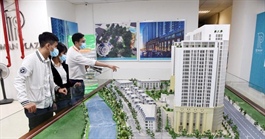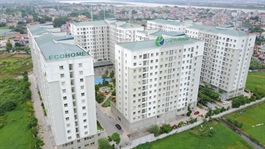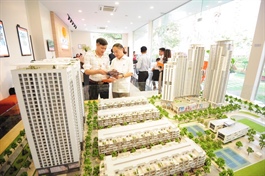Frasers property towards 4Ds perspective
Frasers property towards 4Ds perspective
Hua Tiong Lim, CEO of Frasers Property Vietnam, concurrently CEO of Development at Frasers Property (Holdings) Thailand, took part in an Urban Land Institute Singapore discussion on developer perspectives on transforming cities through decarbonisation, decentralisation, digitalisation, and disclosure, which was part of the 2022 World Cities Summit held in Singapore last week. Lim shares some of his insights on what goes into creating thriving cities through these 4Ds.
Decarbonisation
Sustainability is now on the main agenda of countries, also be a social license for companies. Multinational real estate firms such as Frasers Property are in a privileged position to play a major role in reducing their carbon footprint.
In line with group-wide sustainability goals, Frasers Property Vietnam is making significant progress towards its main sustainability goals. These are: being a net-zero carbon corporation by 2050; being climate-resilient and establishing adaptation and mitigation plans by 2024; green-certifying 80 per cent of its owned and asset-managed properties by 2024; financing the majority of its sustainable asset portfolios with green, sustainable financing by 2024; and training all of its employees on sustainability by 2021.
Frasers Property recognises that emerging technologies and solutions will be critical to help the company accelerate its sustainability goals, so it is an ongoing journey to keep track of these possibilities and improve its processes and systems to reach sustainability goals faster.
A key proof point, Melinh Point, a Grade A office building in Ho Chi Minh City’s central business district (CBD), has undergone a major asset enhancement initiative to be redeveloped with new green features with the adoption of environmental-friendly and advanced technologies to transit to lower-carbon energy sources, which are important in the company’s contribution to the fighting of climate change.
Worc@Q2, another new-prestigious office building of Frasers Property, is now getting ready to certify as a green building with a key focus on energy-efficient solutions.
Frasers Property Vietnam recently joined industrial property development, the hottest property segment in Vietnam, with high respect for clean and sustainable development. Binh Duong Industrial Park (BDIP), its first industrial park in Vietnam, is on track to be a green industrial park that achieves LEED certification. It is expected to reduce 40 tonnes of CO2 and substitute 16 tonnes of coal burned every year.
Binh Duong Industrial Park, a sustainable industrial park developed by Frasers Property Vietnam
In its effort, 15 per cent site area of the park is covered by indigenous trees. Low-power-density LED lighting is installed for premise zones while internal roads are lit up by solar lighting and controlled by a timer.
Solar photovoltaic systems, meanwhile, are being implemented while vegetative roof systems are installed to improve indoor air quality. To lower personal environmental footprint, Frasers Property encourages tenant staff to cycle to work with support in bicycle parking lots and showering facilities for cyclists, as well as charging stations for those going green with electric cars.
For many tenants, particularly multinational groups, the choice of green buildings is growing in importance, partnering with every stakeholder in the value chain to achieve sustainability goals.
Most tenants in commercial developments such as Melinh Point are currently on green leases, and the same approach will follow for Worc@Q2 as well as its first industrial project at the BDIP to spread awareness on climate issues. The One Bangkok, developed by Frasers Property (Holdings) Thailand, is the outstanding format that the company has followed for many other projects. Being Thailand’s largest integrated development over 16.7 hectares, the One Bangkok aims for sustainable development that improves the quality of life for users and is part of the community fabric.
At One Bangkok, sustainable construction management uses circular economy principles to recycle concrete waste into precast panels and develop holistic waste and pollution management plan.
Careful sustainable waste management is expected to reduce around six tonnes of CO2. Once complete, One Bangkok is expected to meet LEED certification and the WELL Platinum global standards, setting a new benchmark for green development in Thailand.
Decentralisation
City urban planners have to be responsive in reviewing and updating zoning plans and regulations to allow greater flexibility in response to the changing landscape. Apart from key projects located in the CBD areas, many others are built in areas further afield. Worc@Q2, offering approximately 4,500 sq.m of net leasable area that takes 15 minutes to the CBD, is poised to capitalise on the trends for office decentralisation and the setting-up of backup offices within Ho Chi Minh City.
The BDIP is located at a prime location that takes 20 minutes to Thu Dau Mot city, a destination for investors in advanced logistics. It has synchronous infrastructure, easy connectivity, and is labour-abundant. The One Bangkok is set to be a city within a city, within 15-20 minutes on foot or bicycle to key parts of Bangkok. The district will be peppered with activated public spaces, a place that tourists and locals alike will want to go to and keep returning to; a place to work, shop, play, and create.
Digitalisation
Cities and businesses have to tap into technology/digital solutions to meet their customers’ needs. Having seen the possibilities and benefits, maintaining decent productivity will help accelerate the rise of smart cities and buildings.
Frasers Property Vietnam recognised early in 2021 that the handover of its newly completed apartments in Q2 Thao Dien may be disrupted due to lockdowns and the curtailment of overseas travel. To overcome this, the company assessed a third-party digital solution, HoloBuilder, that offers real-time virtual visits via pre-captured 360-degree panoramic high-definition photography of individual apartments and shared facilities including the library, swimming pool, and community room. This enabled customers to do a virtual walk-through to experience their new home.
In addition, homeowners were able to submit comments for a list of possible defects directly within the app without being physically present. For homeowners who wished to purchase furniture or appoint interior design services, exact measurements within individual apartments were also displayed.
More than 90 per cent of units handed over utilised this solution, a first in Vietnam, which helped ensure the health and safety of homeowners and the company’s staff. With the success and positive feedback, Frasers Property has had for this innovative deployment, they are further implementing the same solution across their commercial and industrial developments.
In the One Bangkok project, the entire community is made possible by a smart, centralised infrastructure system, the first of its kind for private development in Thailand. This system is responsible for district cooling to enhance liveability in its tropical climate, centralised security, water and energy management systems, a data centre, and more than 250,000 smart sensors that identify opportunities for preventative maintenance and oversee facility management.
Apart from those, a mobile platform connects building users and operations while video analytics with AI features support public safety. A digital twin of a physical and operating environment enables automation of operational processes, and a secure high-speed all-fibre network with seamless Wi-Fi connectivity is built throughout the district.
Disclosure
With Frasers Property’s consistent and continuous efforts made toward sustainable development, its projects have had recognised with respective awards.
Following the completion of the refurbishment works in early 2021, Melinh Point became the first existing non-residential building in Vietnam to achieve the prestigious Green Mark Platinum Certification awarded by Singapore’s Building and Construction Authority.
Frasers Property Group topped the Global Real Estate Sustainability Benchmark (GRESB) rankings with five global and regional sector leadership positions. They are also taking part in this journey and developing in an attempt to get high-score certification from the GRESB annually.
Also in 2021, to further embed environmental, social, and governance considerations across their value chain, Frasers Property unveiled its responsible sourcing policy. It outlines an approach that will be integral to the success of its net-zero carbon goal and the resilience of its business in the long term, towards responsible sourcing and establishment of the expectations it has on all suppliers. Frasers Property believes that adopting a partnership-based approach with reputable third parties like strong organisations, who recognise its sustainability efforts, will be integral to the success of the company’s net-zero carbon goal and the resilience of its business in the long term.





















